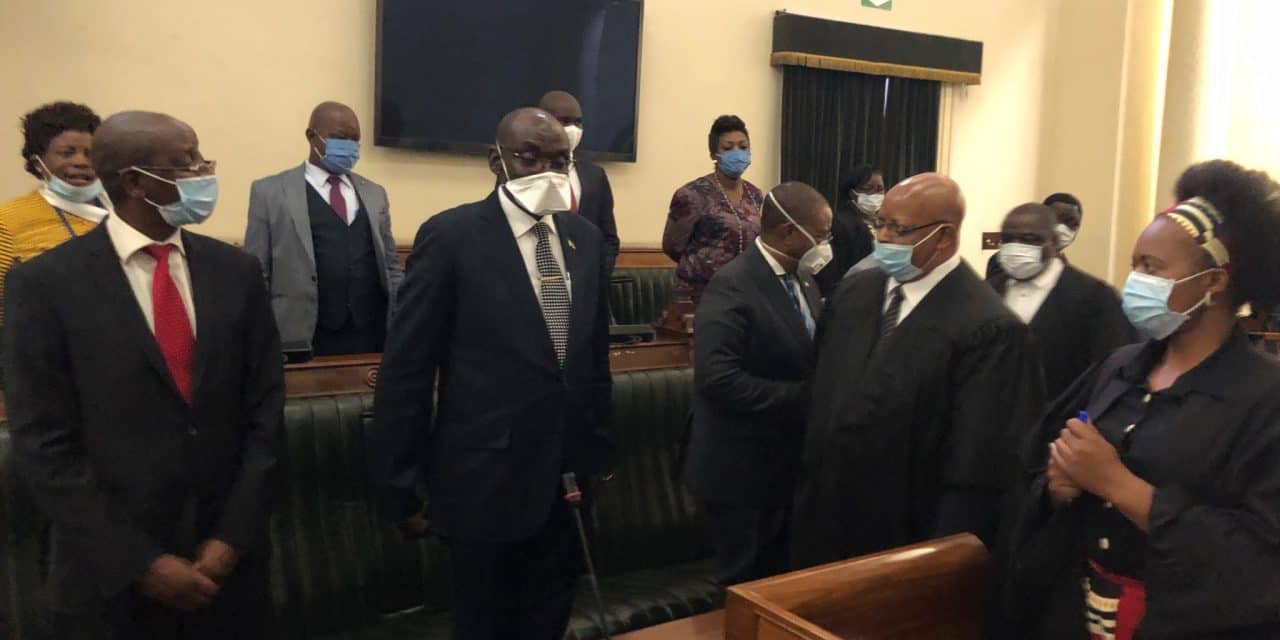BY ALEX T MAGAISA
When I wrote last week’s BSR on the issue of recalling Members of Parliament from Parliament, I was oblivious of the fact that the issue was already before the legislative body. Today, Parliament was convened to announce that four (4) MPs of the MDC Alliance have been recalled in terms of section 129(1)(k) of the Constitution (the recall provision). This circumstance has attracted a lot of debate. This BSR provides some observations on what is happening.
What does the recall provision say?
The last BSR gave a detailed account of the law of parliamentary recall but for the sake of clarity, I should restate the terms of section 129(1)(k).
It provides that the seat of an MP becomes vacant if the member has ceased to belong to the political party of which he or she was a member when they were elected to Parliament and the relevant political party has made a written declaration to that effect to the Speaker or the President of the Senate.
Politically, the purpose of this provision is to protect the interests of the party under which an MP was elected. In light of this purpose, the larger question at all times should be, which party did the MP represent at the election? The provision is based on the reasonable belief that an MP would be a member of the party that he represented at the election.

Lillian Timveos
Which MPs have been recalled?
The recalled MPs are Honourables Charlton Hwende, Prosper Mutseyami and Tabitha Khumalo from the National Assembly and Senator Lillian Timveos from the Senate.
Who recalled these MPs?
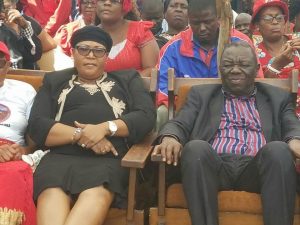
The MPs have been recalled by the MDC-T led by acting President Thokozani Khupe based on a letter written by Senator Douglas Mwonzora, in his purported capacity as Secretary-General of that party following last month’s Supreme Court judgment. They claim that these MPs represent the MDC-T and they have a right to recall them.
It is important to note that Khupe is also the leader of another political party called the MDC-T. This MDC-T contested elections in 2018 and performed dismally, winning just two seats in Parliament. The decision by the Speaker and the President of the Senate to allow Khupe to recall MDC Alliance MPs places Khupe in a bizarre situation in which she can lay claim to MPs who are her party’s competitors and rivals.
It means she is, at present, the leader of two rival political parties that contested each other in the elections and are separately represented in Parliament. This position allows her to move seamlessly from one party to another and to cherry-pick whom to keep and whom to recall. Unsurprisingly, she has chosen to recall her opponents who defeated her party in the election.
What role did the Speaker and the President of the Senate play?
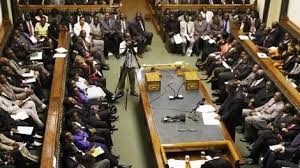
While the Constitutional Court has on previous occasions said the Speaker and the President of the Senate have no substantive role in the process of recalling MPs, and that their role is merely to receive a written notice of cessation of membership from a party, it is clear that in this case, as in others, the two parliamentary officers had to make a substantive choice concerning disputed facts. This is because they had before them letters from different parties, each claiming authority over the MPs.
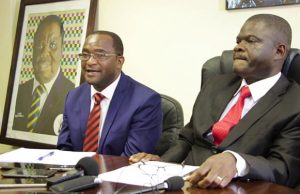
One letter was from Douglas Mwonzora, claiming that the MPs belonged to the MDC-T, and another was from Charlton Hwende, claiming that they were MDC Alliance MPs. A factual and legal question had to be answered: whose members were they when they contested election in 2018? Mwonzora argued that they were MDC-T members while Hwende argued that they were MDC Alliance members. There was, therefore, a dispute of fact which needed to be resolved.
This means the Speaker and the President of the Senate had to and did resolve a factual dispute. In finding for Mwonzora and the MDC-T, they both made a choice, taking the view that the MPs who contested under the MDC Alliance were members of the MDC-T. If they had been mere recipients of notice they would have rejected Mwonzora’s letter because clearly, they have MDC Alliance MPs in Parliament and Mwonzora was introducing a new fact which they could not take at face value. They had to exercise their minds and make a judgment in dismissing the presumption that the MPs were MDC Alliance members.
Therefore, despite denials, they exercised a quasi-judicial role based on the facts before them. This puts paid to the view of the Constitutional Court in previous cases that the Speaker and the President of the Senate do not have a quasi-judicial role. The question, however, is whether the two parliamentary officers had sufficient facts to make that decision. In other words, having made an administrative decision, did they comply with the rules that must apply to such a process? The courts have previously stated that there is no need to invoke fundamental rights and freedoms but, in light of the de facto quasi-judicial role played by these parliamentary officers, this needs revisiting.
Who did the recalled MPs represent when they contested elections?

The recalled MPs represented the MDC Alliance at the elections in 2018. There was another party called the MDC-T, which was led by Thokozani Khupe. The MDC Alliance was accepted as a distinct political party by the Zimbabwe Electoral Commission. The courts, including the Constitutional Court, have recognised the existence of this party. Politically, the call by the government for the party to join the POLAD process confirms the official recognition of its existence. It has always been held out to be and accepted as a political party in Parliament and all its proceedings.
Before the 2018 elections, Senator Mwonzora as the then Secretary-General of the MDC Alliance told the press:
“The MDC Alliance is treated as a political party. It’s a political formation. It’s a political entity which is capable of contesting elections. We did that to go around the legal hurdle of whether we were a political party or not. So officially, yes, we are a political party. We are contesting as a political party called the MDC Alliance”
However, Senator Mwonzora’s current narrative to the Speaker and the President of the Senate was different, stating that the MDC Alliance is not a political party. These apparent contradictions notwithstanding, the Speaker and the President of the Senate chose to believe his narrative. This is even though the two Parliamentary officials had notice of a different view by MDC Alliance Secretary General Charlton Hwende. Choosing one narrative ahead of the other is a process of quasi-judicial decision-making which requires adherence to fundamental rights and freedoms and raises questions whether they had the tools to make the right decision.
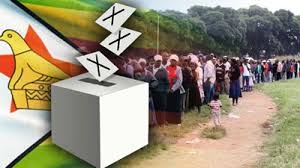
The outcome of the decision is that while voters chose MPs believing that they were voting for the MDC Alliance, as opposed to the MDC-T, Parliament has now accepted a bizarre scenario in which the party that was not represented at the election now has the power to recall those MPs. And their competitor, Khupe, now has the power to recall them. In fact Khupe whose party managed to win just 2 seats at the elections now has, through a golden back-door sanctioned by the Speaker and the President of the Senate, scores of parliamentary seats.
Why have these four MPs been chosen for recall?
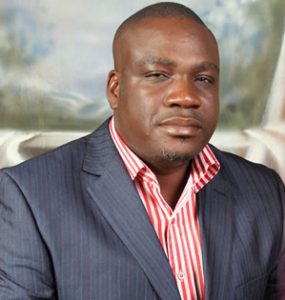
Charlton Hwende
The four recalled MPs are not the only MPs that Khupe and her group are laying claim to. So why have they been chosen? Politically, the strategy is in three parts.
First, these four MPs have been chosen because they are the leaders of the MDC-Alliance in Parliament. Khumalo, who is the MDC Alliance Chairperson is the leader of the opposition in the National Assembly while Timveos is the leader of the opposition in the Senate. Mutseyami is the MDC Alliance Chief Whip while Charlton Hwende is the Secretary-General of the party.

Prosper Mutseyami
The idea appears to be to attack the head of the MDC Alliance. Mwonzora and Hwende have had a long-standing battle which culminated in the battle for the Secretary-Generalship at the MDC Alliance Congress in 2019 in which Hwende prevailed. This part of the recall seems like a continuation of a personal war marked by a streak of vindictiveness.
The second part of the strategy is to divide and rule. Mwonzora’s notice could have applied to all MPs they claim to be their party’s members in Parliament. They have chosen a small group in the hope of isolating them from the larger group. This, they hope, serves as a notice to the remainder of MPs whose position is now precarious. The newfound power of recall now hangs like the sword of Damocles above the heads of the remaining MPs.
The hope is that the other MPs will be cowed into submission and follow the demands of the group that wants to reconstitute the MDC-T following the Supreme Court judgment. The recall is a strategy to coerce MDC Alliance MPs into supporting the group that was dubiously awarded a judgment by the Supreme Court. They know that an MP’s seat represents an important part of an MP’s personal political economy. It brings prestige, power and material benefits to the individual MP.
This situation, therefore, represents a stern moral test for each MDC Alliance MP. They must make a choice between safeguarding their personal political economy, which would be selfish or acting for the greater good of the party under which they were elected, the MDC Alliance, which would be selfless.
To go with the view that they are MDC-T members would be to forsake the MDC Alliance, the party under which they campaigned and were elected into Parliament. It would also be politically duplicitous; fraud on the people who voted them as MDC Alliance representatives.
The third, which is also a strategy of divide and rule relates to the MDC Alliance as a whole. If Khupe, Mwonzora and Komichi can successfully isolate so-called MDC-T MPs, from the MDC Alliance and the other MDC Alliance MPs carry on, they will leave Chamisa politically vulnerable.

The real target of this grand political strategy is the person who provides the most credible political competition to Emmerson Mnangagwa. If the MDC Alliance succumbs to this divide and rule, it will be the end of opposition politics as we have known it for the past two decades. And this will have been achieved by paying one faction of the MDC against the other.
Proportional Representation MPs
The absurdity of separating the MDC-T from the MDC Alliance under which MPs were elected is clear when one considers the matter of MPs who are in Parliament by proportional representation (PR). These MPs include 60 female MPs in the National Assembly elected on the women’s quota and 60 senators who occupy the Senate. How PR seats are allocated to parties defies the logic of separating the MDC-T from the MDC Alliance because the system recognises only parties that contested in the National Assembly elections as distinct, separate and indivisible political parties.
Section 120(2)(a) of the Constitution provides that senators are elected under a “party-list system of proportional representation”. It is based on the votes cast for candidates representing political parties in each of the provinces in the election of National Assembly members. What this means in layman’s language is that the election of senators is dependent on the overall votes for each political party in the National Assembly elections. That party cannot be subdivided into different entities or the whole formula would collapse or produce a different outcome. In this case, the party is the MDC Alliance, not its constituent parts. If the approach taken by Parliament is to be followed to its logical conclusion, the entire complexion of the Senate and 60 PR women’s seats would change.
What happens next?
The four MPs were the equivalent of testing the deep waters. Khupe and her group have now been given a legal machete which they can use at will. The Speaker and the President of the Senate have given a weapon to someone who lost dismally in the last election. She is now, with the aid of the machinery of the state, in a position to determine the fate of the MDC Alliance, which she never warmed up to in the first place. She may go on to recall more MDC Alliance MPs. The MDC Alliance MPs might choose to wait for their fate. The lily-livered may jump ship, choosing safety of their personal political economy ahead of party loyalty. Others might elect to resign, opening the route for more by-elections.
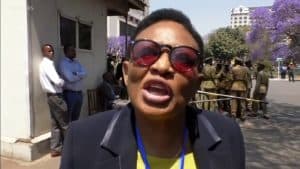
Thabitha Khumalo
The four might choose to fight in the courts of law, although that seems like a futile pursuit given the disposition of Zimbabwe’s political referees. The only benefit that a legal fight might have would be to expose and embarrass the courts and let posterity be a judge of their performance. But that is hardly a consolation to present generations. Whatever happens, there will be by-elections and eventually it is the people who will have to decide. The battle between the MDC factions will only be resolved conclusively in the court of public opinion, not in the courts of law and now, as we have seen, not in Parliament. To believe otherwise is hopeless fantasy.
Conclusions
The decision by the Speaker and the President of the Senate makes nonsense of the claim by the courts in previous cases that these parliamentary officers do not have a substantive role in the parliamentary recall process. They do. By making decisions where there are disputed facts, they are exercising a quasi-judicial role which makes them political referees. Their independence and impartiality, as well as their adherence to constitutional standards and rights, are therefore crucial matters for consideration.
The recall of MDC Alliance, in this case, raises serious questions of fact which the Speaker and the President of the Senate were not equipped to deal with. They ought to have deferred the matter to the parties to resolve internally or through the courts of law. The notion that the seat becomes vacant by operation of law is conditional upon the legality of the processes and it is not for the Speaker and the President of the Senate to decide them where the facts are in dispute. They should refuse to be drawn into internal party disputes but if they choose to exercise a quasi-judicial role, they must fulfil the principles of administrative justice, which include principles of natural justice.
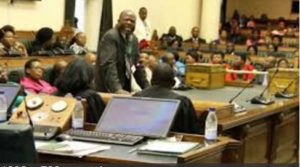
The strategy in play is divide and rule, which includes isolation of the leaders of the MDC alliance in Parliament, in the hope of pressuring the rest to comply and also with the added agenda of splitting the MDC Alliance and leaving its President Nelson Chamisa politically vulnerable. The question is whether the MDC Alliance MPs have the political nous and strength to take a moral stand even at the expense of their personal and material interests.
Since this is a strategy that is carefully engineered from the authoritarian regime with the cooperation of willing opposition elements, it’s a historic challenge which tests the moral fibre of the MDC Alliance MPs. They could either succumb to the regime and its surrogates’ divide and rule strategy or stand as guardians of the struggle against authoritarianism, corruption and misrule. In short, they can choose to be co-opted or to continue resisting authoritarian rule.
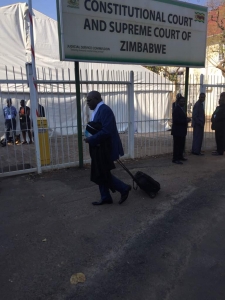
Biti going about his business at ConCourt
Finally, the strategy of lawfare will continue to be used against the democratic movement in Zimbabwe. Everything will be done under the guise of the law. The legal facade, which has strong defenders and apostles raising the flags of legalism and constitutionalism will be touted as true, fair and impartial. But it merely serves to conceal the crude manipulation of legal institutions and political referees. One would have to be incredibly naive if members of the ruling party’s politburo and the central committee are held out as impartial arbiters of a political dispute in the opposition.
It is a common strategy of lions to identify one buffalo and to isolate it from the larger herd. On its own, the buffalo is vulnerable. It might put up a tenacious fight but the lions bide their time circling around it and taking heavy bites. In such moments, the survival of the buffalo hangs on the vigilance, courage and selflessness of its peers. Sometimes the herd comes to the rescue and it is the lions that have to run for cover. Gored by sharp horns, one or two of the lions may never recover.

